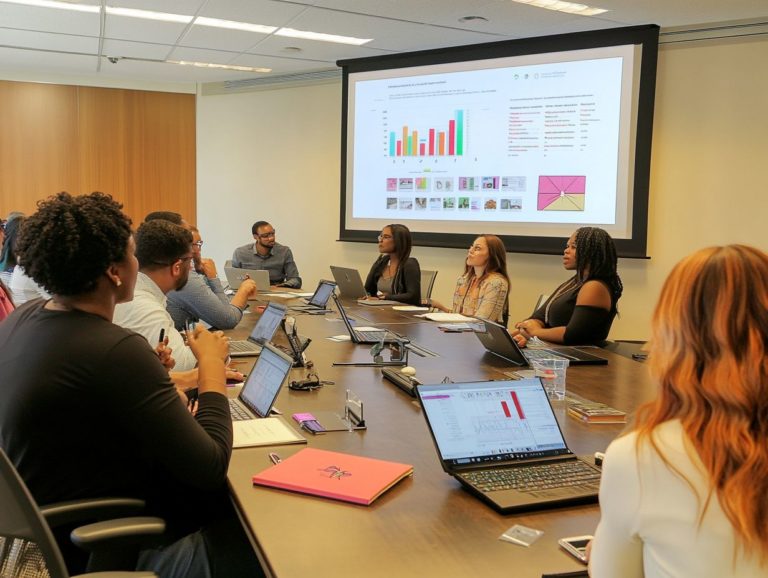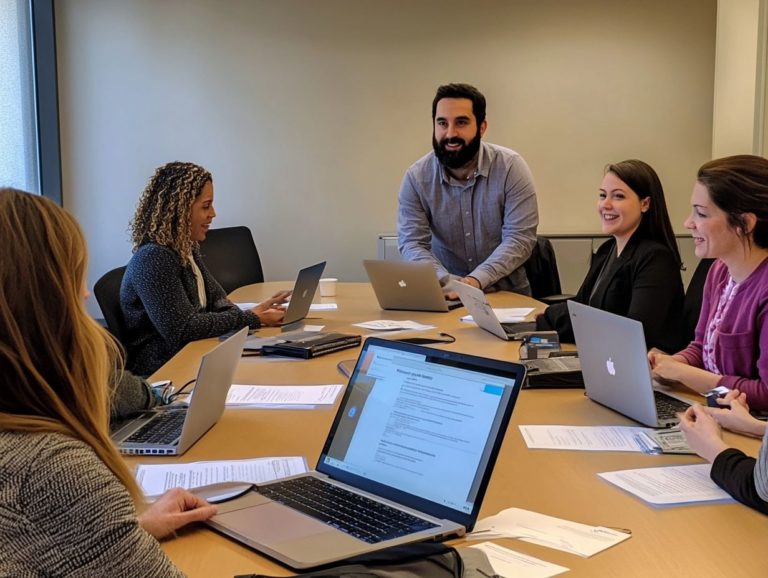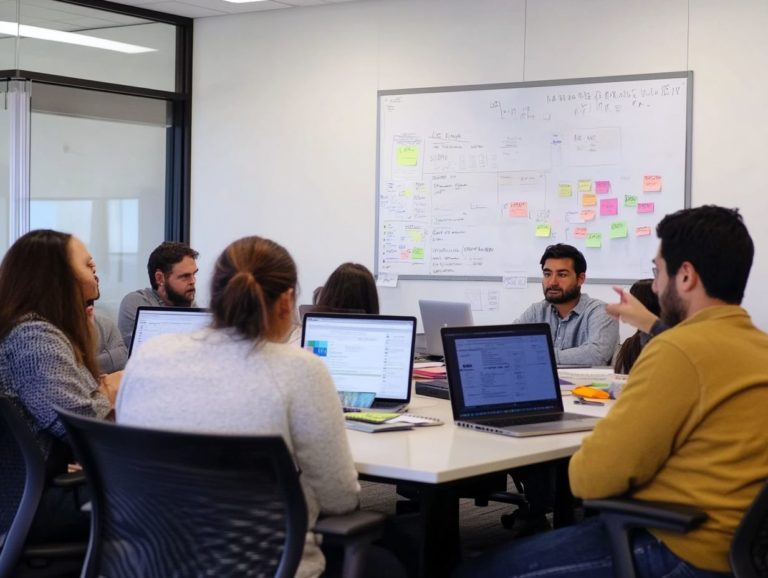“How to Use Surveys to Enhance CRM User Training”
Effective training is crucial for improving your CRM team’s performance. It directly impacts customer satisfaction and the quality of your relationships.
Using surveys helps you gather valuable feedback that enhances your training programs and promotes a culture of continuous improvement. This article delves into the importance of collecting input from participants, provides expert guidance on crafting impactful survey questions, and outlines best practices for implementing the feedback you receive.
You will learn how to measure training success and ensure ongoing improvements, making the training process more effective for everyone involved.
Find out how surveys can transform your CRM training experience!
Contents
- Key Takeaways:
- Importance of Effective Training
- Using Surveys for Training Enhancement
- Creating Survey Questions
- Implementing Survey Results
- Measuring Training Success
- Future Training Improvements
- Frequently Asked Questions
- Want to know how surveys can supercharge your CRM user training?
- What type of surveys should be used for CRM user training?
- How should pre-training surveys be utilized in CRM user training?
- What should post-training surveys focus on?
- How can ongoing feedback surveys be incorporated into CRM user training?
- How can survey results be used to enhance CRM user training?
- Continuously Incorporating Feedback
Key Takeaways:

- Regular feedback improves training effectiveness.
- Focus on clarity, relevance, and length when creating survey questions to ensure valuable insights.
- Utilizing survey results for continuous improvement can lead to a more effective CRM system.
Importance of Effective Training
Effective training is essential for unlocking the full potential of your Customer Relationship Management (CRM) systems. By providing your teams with the right skills and insights, you can substantially enhance the customer experience.
This paves the way for higher retention rates, improved engagement, and the successful achievement of your strategic goals. Clear and focused training programs help you find skill gaps and identify opportunities for improvement.
This ensures that your teams remain consistently aligned with customer needs and expectations.
Using Surveys for Training Enhancement
Utilizing surveys is an exceptional strategy for elevating training programs. This approach enables you to gather vital feedback from both customers and team members.
By tapping into these perspectives, you can refine and enhance your training efforts, ensuring they resonate deeply and yield optimal results.
Benefits of Gathering Feedback
Gathering feedback through surveys offers numerous advantages for your organization. It enhances customer satisfaction, improves training performance, and contributes to a superior customer experience.
By carefully looking at customer feedback, you can identify gaps in training programs that may impede employee performance. This helps you create targeted development programs, ultimately resulting in a more skilled and capable workforce.
Soliciting feedback provides you with crucial performance metrics that illuminate customer preferences and expectations. Integrating feedback can change your organization’s strategy, laying the groundwork for sustained growth and success.
Creating Survey Questions

Crafting effective survey questions is essential for capturing meaningful feedback from customers and training participants. This enables your organization to extract critical insights that can significantly enhance your CRM strategies and improve training programs.
Best Practices for Effective Surveys
Crafting great survey questions is your secret weapon! Get ready to unlock actionable insights that will elevate your training programs.
When crafting survey questions, prioritize best practices like clarity, brevity, and relevance. This ensures that the feedback you gather is actionable. It also helps enhance your training programs.
This becomes particularly vital when matching your surveys to your training goals and managing customer relationships. Your questions should effectively measure participant satisfaction while also exploring broader themes, such as areas for improvement and the effectiveness of your training modules.
Incorporating open-ended questions helps gather richer insights, enabling you to refine your programs based on authentic customer feedback. By carefully considering these elements, you foster a survey process that directly supports your strategic business initiatives and boosts overall engagement.
Implementing Survey Results
Effectively implementing survey results is essential for elevating your training programs.
By leveraging tangible feedback from customers and team members, you can adapt and refine your strategies. This drives meaningful improvements that enhance overall performance.
Using Feedback to Improve Training
Leveraging feedback to refine your training programs ensures they remain relevant and highly effective. This ultimately enhances the customer experience and boosts overall performance within the CRM framework.
By actively seeking insights from participants, you can pinpoint knowledge gaps and areas ripe for improvement. This enables timely adjustments to your course content and delivery methods.
This continuous improvement model underscores the importance of adaptability. It positions your training to meet the evolving needs of your customers more effectively.
Incorporating direct feedback from end-users into your training modules creates a culture of engagement. This enables employees to contribute to best practices that elevate customer interactions and foster lasting loyalty.
Measuring Training Success

Measuring training success is essential for evaluating the effectiveness of training programs. This process offers organizations vital metrics that guide decision-making and strategic planning within their CRM initiatives.
Understanding these outcomes enables you to refine your approach and enhance overall performance.
Tracking and Analyzing Metrics
Tracking and analyzing key metrics is essential for understanding how training impacts team performance and customer satisfaction. This insight enables you to make informed adjustments to your CRM strategies.
By diligently monitoring these metrics, you can pinpoint areas that need improvement. This ensures your training programs align seamlessly with your broader organizational objectives.
This practice sharpens employee skills and cultivates a deeper connection with your customers. The insights gleaned from data analysis can lead to tailored engagement strategies that resonate.
By leveraging analytical techniques, you can identify trends and patterns in customer behavior. This allows you to refine your approaches and drive higher retention rates.
In doing so, you create a more agile environment where both your staff and clients feel valued and understood.
Future Training Improvements
Future training improvements rely on using feedback effectively. This ensures that you, as an organization, remain agile and can swiftly adapt to the evolving needs and expectations of your customers within your CRM frameworks.
Frequently Asked Questions

Want to know how surveys can supercharge your CRM user training?
Yes, surveys can be a valuable tool for enhancing CRM user training. They provide feedback on the training program’s effectiveness and help identify areas for improvement.
What type of surveys should be used for CRM user training?
The type of survey used will depend on your training goals. Common types include pre-training surveys, post-training surveys, and ongoing feedback surveys.
How should pre-training surveys be utilized in CRM user training?
Pre-training surveys assess trainees’ current knowledge and skills, allowing trainers to tailor the program to better meet their needs. They also identify knowledge gaps to address during training.
What should post-training surveys focus on?
Post-training surveys should gather feedback from trainees about the training program’s overall effectiveness. This includes insights on the training content, delivery methods, and suggestions for improvement.
How can ongoing feedback surveys be incorporated into CRM user training?
Ongoing feedback surveys can be used throughout the training to gather insights and make adjustments as needed. This ensures the training meets trainees’ needs and promptly addresses any issues.
How can survey results be used to enhance CRM user training?
Survey results reveal the strengths and weaknesses of the training program. You can use this information to make improvements, better meet trainees’ needs, and enhance their learning experience.
Continuously Incorporating Feedback
By continuously incorporating feedback into your training processes, you create a habit of continuous improvement. This keeps your teams aligned with customer expectations while enhancing their CRM capabilities.
Actively seeking customer insights and weaving them into your training allows you to ensure that your educational programs remain relevant and highly effective.
Gathering feedback from trainees and end-users provides invaluable perspectives that refine your instructional content and delivery methods. This iterative approach sharpens team skills and establishes a robust feedback loop that promotes adaptability.
By harnessing these insights, you can supercharge your CRM strategies to address the ever-evolving needs of customers while optimizing operational efficiency.






